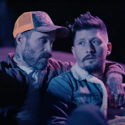
I’ve been trying all day long to avoid Cornell professor Dr. Ritch Savin-Williams arguing on The Good Men Project that, hey, lots of gay kids don’t have it so bad these days, and that’s why the message of “It Gets Better” might be misguided. Savin-Williams means well. That’s why he should denounce his own position.
Citing a lack of evidence (or rather, old and bad evidence) to show that gay tweens and teens are not any worse off than straights, Savin-Williams attempts in “The Gay Kids Are All Right” to dismantle the message of telling gay youth that it gets better as adults, because many of these gay kids are actually having a lovely upbringing, and never realized they were supposed to hate themselves and get picked on.
This myth is embraced by both ends of the political spectrum. Progressives, gay activists, and helping professionals (clinicians, medical providers, public health officials) believe that such dire messages will raise awareness of gay-rights issues and garner needed services for gay youth. In addition, government funding for research often depends more on investigations that explore what goes wrong than what goes right in human development.
Conservative religious and political advocates use the gay suicide myth to give warning to youth who are “considering” being gay or who have crossed the line and might be a candidate for conversion therapy that a gay life is hazardous to their health. Their banner is “Be Healthy, Be Straight”—as if it were a choice, and an easy one.
From these early research studies to the present day, the proportion of at-risk gay youth has significantly decreased. The major difference now is that when we ask gay youth about their mental health, we can tap into more representative samples of youth. As more young people come out as gay, they are looking healthier. Another interpretation is that life is better for gay youth now than it was for those growing up 30 years ago.
But does a lack of research disprove a reality? That many gay youth are, in fact, tormented every day? Or, if not bullied to the point of wanting to take their own lives, at least socially conditioned — by parents, friends, administrators, the media — to think their differentness is different enough they cannot live openly and wonderfully?
When research reports gay versus straight differences in depression, anxiety, and suicidality, they evaporate when one does one or all of the following.
1) Separate lesbians from bisexual women. In previous research, the two groups were combined because of small numbers. Once separated, lesbian youth often report equal or even greater mental health than heterosexual women.
2) Control for gender expression. It is not sexual orientation per se that is the most accurate predictor of at-risk status. Rather, many youth (regardless of their sexuality) are at-risk if they do not act like someone of their sex is “supposed” to act. That is, bullies select their victims based less on their same-sex sexual attractions than on their gender non-conformity. Gay quarterbacks and track stars in high school are not bullied to the same degree as are gay theater and drama club members.
3) Consider that gay youth are more likely than straight youth to give “false positive” statements. Some gay youth report that they attempted suicide, but further questioning reveals that they actually did not. Perhaps they had a suicidal thought, but that’s not the same thing as a suicide attempt. Why gay youth are more likely than straight youth to falsely report their mental health status is not known.
All well and good, but his argument is steeped in the same “insight” being pushed by hate leaders like Focus On The Family’s Candi Cushman, who says effective anti-bullying techniques must focus on students bullied for any reason, not specifically for being gay.
How about we take this to the next level?
Our newsletter is like a refreshing cocktail (or mocktail) of LGBTQ+ entertainment and pop culture, served up with a side of eye-candy.
“Based on my read of the scientific literature,” writes Savin-Williams, “the conclusion I reach is that gay youth are rather ordinary adolescents and young adults. Yes, some are at-risk, but these clinically fragile youth exist in the same proportion and to the same degree among heterosexual youth. Why this is important is that as a clinician, I’m worried about the ‘message’ we’re giving to gay youth. I’m worried about suicide contagion (publicizing gay youth suicide may provoke similar behavior among vulnerable youth). I’m worried about our inability to understand their lives. And, I’m worried about adult tendencies to insert our life experiences onto those of youth. Just because we had a difficult gay adolescence does not mean that today’s gay youth experience the same pain.”
Savin-Williams and those who like him have fine reason to be worried, but direct messaging aimed at gay youth isn’t why.
No, not all gay kids are bullied or think about suicide. But there are those who think the better way out of hell is running in front of a tractor trailer to put an end to it all. (Yes, that’s Brandon Bitner in the photo up there.) And there are those who think it’s perfectly okay to torment queer kids in class, or kids who come off as queer, because that’s a normal part of growing up, and daddy didn’t raise nobody to act queer.
It shouldn’t be. It needn’t be. And a campaign that attempts to tell LGBT children not to hate themselves — and that killing themselves will eliminate any opportunity to experience the wonderful things that being gay will bring — is an idea we should all support. Fine tune, revise, and update? Of course.
But there is nothing political or partisan about wanting to make young people in this country who are told from the time they are born they are somehow less than — by elected officials and police officers and corporations and living monsters — that they are nothing of the sort.


















Jigae
He’s a fucking tool. He was my prof at Cornell and took a straw poll in class via anonymous submission about how many people in this class (Sexual Minorities) had attempted suicide and by what manner. A couple classes later he announces that “this unscientific poll supports his data that gay youth are no more likely than straight youth to attempt suicide” and that no gay or lesbaian in class had attempted it.
Except I know that’s not true. And I call him out on it. And he has the gall to say “Real suicide attempts, not methods that were unlikely to succeed or could be characterized as cries for help.” Multiple people told me afterwards that he had also ignored their submissions.
A lesser crime: He also literally gave exams with questions like “Who was the author of chapter 14: Twin Spirits? A.) John Smith B.) John Doe C.) Jane Smith d.) Other.”
He’s a bad scientist and a worse pedagogue advancing his own misbegotten philosophical agenda.
Devon
“Gay quarterbacks and track stars in high school are not bullied to the same degree as are gay theater and drama club members.”
So choir singers get picked on more than jocks?
Fascinating and insightful information, professor. Tell me more.
Jigae
… absurdly problematic. He denies gay youth their voice based on his external perspective of what constitutes an actual attempt. I know it’s necessary to operationalize “suicide” in order to study it, but what’s to say the increased questioning isn’t creating false negatives?
Qjersey
@Jigae:
Perhaps he was just dumbing down the exams for the rocket scientists at Cornell.
As for his science and pedogogy…any first year grad student can rip any number of prominent researchers to shreds for their methods and pedagogy.
Michael Hudston
This man is not just an idiot, he’s actually quite Dangerous. He should not be allowed to continue to spout such trash.
Jigae
@Qjersey: Umm… so besides generally defending academia what are you adding to this discussion? Any thoughts on the article?
Henry Holland
“Gay quarterbacks and track stars in high school are not bullied to the same degree as are gay theater and drama club members.”
Admittedly, I haven’t been in high school since 1978 so things might have changed, but it was my experience that the jocks who came out got it a hell of lot worse than the drama club members. The jocks were traitors and possibly guys who wanted to look at other dude’s dicks in the shower. The drama club were presumed to be fags anyway, even when they were straight (like Finn on Glee).
I think I chose the wrong career, I could be at an Ivy League school getting paid to spout non-testable bullshit.
Hilarious
@Devon: Stop living in the 80s. Kids don’t split up into groups based on what they do anymore.
Both myself and a kid on the football team got called “gay” in the same Spanish class all year long and people kept making up new phrases to use in Spanish to describe all of the gay things we were doing together(IE: Kissing in the bathroom).
Everyone gets picked on. No one is exempt. No one uses the word jock anymore.
desdemona
so what hilarious, you’re saying that everybody gets picked on and getting picked on for being gay is just a rite of passage that we should accept? um… no, that $hit needs to be squashed.
Taylor Siluwé
No. 8 · Hilarious
Really? No one uses the term “jock” anymore? I’m so out of touch.
Rick Gold
@Taylor Siluwé: Only 35 year old “straight acting” homosexuals who wear backwards ballcaps and camo shorts. Oy.
Matthew
How is there a difference between gay and straight suicides? Well first of all straight boys and girls don’t get told that they are going straight to hell when they are coming out of the womb. Second, teachers these days let the word “Gay” and “F@g” slip by all the time, not to mention if your gay that you are considered weak and a stereotype. Oh and some parents tend to disown their kids if they come out. Just having the word gay associated with you makes you a target for hate crimes and bullying, it’s an automatic. Straight kids can look to god for help, we can only hope for the best, that the next time we cross paths with someone who doesn’t like the way we walk, that we just leave the situation with just hateful words. So to say that there is no difference between gay and straight suicides is a gross understatement.
Hilarious
@desdemona: Where did I say it’s a rite of passage or shouldn’t stop?
Now how exactly are YOU going to stop it? You’re just running your mouth.
Shake-n-Bake
@Matthew: The causes of gay and straight suicides are different.
The end result is still, always the same. Sadly. :/
They all have my sympathy…
toyotabedzrock
If we ignore LGBT youth it might be easier for this shit bag to take advantage of them.
Thats what his article is about.
Christine
Do you all really think heterosexual boys don’t get called faggots and get bullied in HS? What fucking planet are y’all from?
The shit starts when yr mode of gender-expression falls outside the mean of what is considered male or female:
“It is gender expression, not sexual orientation per se, that is linked with decreased psychological well-being, and this is likely the result of bullying.”
You damn right.
It doesn’t hurt any less being called a faggot when straight and the bullying hurts just as much. AND straight kids who fall outside the norms of “normal” gender expression still attempt or commit suicide because bullying and name-calling won’t stop.
gender-expression determines who gets bullied and who doesn’t not sexual preference.
Sam
1) Separate lesbians from bisexual women. In previous research, the two groups were combined because of small numbers. Once separated, lesbian youth often report equal or even greater mental health than heterosexual women.
Shouldn’t that read “lesbian youth often report equal or even greater mental health than BISEXUAL women”? In the first sentence it clearly readers “lesbians from bisexual women”. Are bisexual women and heterosexual women synonymous terms? Or is the author using the “hetero privilege” that us bisexual women apparently get? Oh wait, that doesn’t exist. Perhaps then bisexual women are included in the lesbian youth comment in the last sentence? Oh wait, then the first sentence would read different. Cut the bi erasure nonsense!